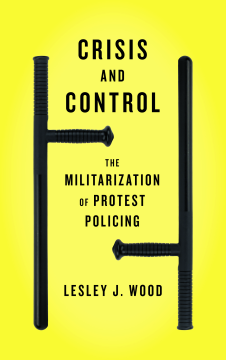
Additional Information
Book Details
Abstract
Crisis and Control explains how neoliberal transformations of political and economic systems are militarising the policing of protest, based on a compelling empirical study of police agencies and practices from 1995 until the present.
Lesley J. Wood shows that the increasing role of the security and defense industries, professional police associations, anti-terrorism initiatives and 'best practices' in policing networks have accelerated the use of less lethal weapons, pre-emptive arrests, infiltration and barricading strategies against protesters.
The book uses Bourdieu and Boltanski to analyse court transcripts, police reports, policy, training materials and the conference programs of professional police organisations to argue that police agencies are neither omnipotent strategists, nor simple tools of the elite, but institutions struggling to maintain legitimacy, resources and autonomy in a changing field.
'A welcome contribution to the literature on the sociology of policing more generally. Smart, erudite, and empirically grounded, Wood's perspective on policing protest exposes deeper, often under-explored, theoretical dimensions of the politics of policing'
James Sheptycki, Professor of Criminology, York University
'Shows clearly that the police wing of the state takes very seriously its task of understanding and defeating social resistance to austerity. Those engaged in that resistance would do well to return the favour. This book provides an excellent source of knowledge and insight into how the not-so-thin blue line thinks and operates'
John Clarke, Organizer, Ontario Coalition Against Poverty
'A balanced, detailed and convincing look at global policing. This is a necessary and rare account that is vital for anyone interested in protest policing and its increasing militarisation, as well as wider forms of global social control under neo-liberalism'
Nina Power, University of Roehampton, co-founder of Defend the Right to Protest
'An engaging and sophisticated study of protest policing, which exposes the threat such policing poses to democracy and the neoliberal dynamics that have made it a preferred strategy for repressing the 99% whenever they challenge the 1%'
William K. Carroll, professor of sociology, University of Victoria
'A powerful dissection of the ways that the policing of protests have been transformed over the last decade'
The Bullet
'A must-read for all who care about freedom of speech and see protest and public demonstration as a necessary and legitimate means of protecting democracy'
Howard F Morton. QC., Barrister
'Sheds light on the economic and political roots of police brutality against legitimate social movements. Unfortunately, this is what our 'democracy' looks like'
Francis Dupuis-Déri, professor of political science, Université du Québec à Montréal, and member of the Observatory on racial, social, and political profiling in the public space.
'A hard-hitting, insightful, and well-researched analysis of the changing forms of protest policing'
Willem de Lint, professor of criminal justice, Flinders University
Table of Contents
| Section Title | Page | Action | Price |
|---|---|---|---|
| Cover | Cover | ||
| Contents | vii | ||
| Acknowledgments | viii | ||
| List of Acronyms | ix | ||
| 1. Introduction | 1 | ||
| 2. Policing Waves of Protest, 1995-2013 | 25 | ||
| 3. To Serve and Protect Who? Policing Trends and Best Practices | 54 | ||
| 4. Local Legitimacy and Struggles for Control | 68 | ||
| 5. Officers Under Attack - The Thin Blue Line, Pepper Spray, and Police Identity | 94 | ||
| 6. Experts, Agencies, the Private Security Sector, and Integration | 109 | ||
| 7. Protest as Threat | 124 | ||
| 8. Urine-filled Supersoakers | 148 | ||
| 9. Crisis and Control | 162 | ||
| Notes | 169 | ||
| References | 173 | ||
| Index | 197 |
